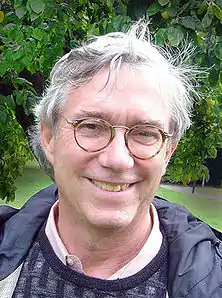Rudy Rucker
Rudolf von Bitter Rucker (born March 22, 1946 in Louisville, Kentucky) is an American mathematician, computer scientist, science fiction author, and philosopher. He is one of the founders of the cyberpunk literary movement. He writes both fiction and non-fiction books and articles. He is best known for the novels in the Ware Tetralogy (series of four books). The first two books (Software and Wetware) both won Philip K. Dick Awards. Now he edits the science fiction webzine called Flurb.
Rudy Rucker | |
|---|---|
 Rudy Rucker, Fall 2004, photo by Georgia Rucker | |
| Born | Rudolf von Bitter Rucker March 22, 1946 |
| Nationality | American |
| Alma mater | St. Xavier High School, Swarthmore College, Rutgers University |
| Occupation | Author |
| Known for | Ware Tetralogy |
| Relatives | G.W.F. Hegel |
| Website | Rudy Rucker |
Early life
Rucker is the great-great-great-grandson of the philosopher Georg Hegel.[1]
Rucker attended St. Xavier High School. Then he completed a B.A. in mathematics from Swarthmore College. Next, he earned Master's and Ph.D. degrees in mathematics from Rutgers University.
Career
He taught at the State University of New York at Geneseo from 1972 to 1978. He got a grant (money to support scholarship) from the Alexander von Humboldt Foundation, so he went to teach math at the Ruprecht Karl University of Heidelberg from 1978 to 1980. He then taught at Randolph-Macon Women's College in Lynchburg, Virginia from 1980 to 1982. Next, he tried being as a full-time author for four years. Inspired by an interview with Stephen Wolfram,[2] Rucker became a computer science professor at San José State University in 1986. He retired from SJSU in 2004. He is a mathematician who is also interested in philosophy. He has written books connecting these two areas, for example: The Fourth Dimension; Geometry, Relativity and the Fourth Dimension; and Infinity and the Mind. Princeton University Press published new editions of Infinity and the Mind in 1995 and in 2005, both with new prefaces; the first edition is cited with fair frequency in academic literature.
As his "own alternative to cyberpunk," Rucker developed a writing style he calls Transrealism. He gave a brief explanation of Transrealism in his 1983 essay, The Transrealist Manifesto. It is science fiction based on the author's own life and immediate perceptions, mixed with fantastic elements that symbolize psychological change. Many of Rucker's novels and short stories apply these ideas. One example of Rucker's Transrealist works is Saucer Wisdom, a novel in which the main character is abducted by aliens. Rucker and his publisher marketed the book as non-fiction as a kind of joke.
Rucker wrote his first Transrealist novel, White Light, while he was at Heidelberg. This Transrealist novel is based on his experiences at SUNY Geneseo.
Rucker often uses his novels to explore scientific or mathematical ideas. For example, White Light examines the concept of infinity. Parts of the Ware Tetralogy (written from 1982 through 2000) are an explanation of using natural selection to develop computer software (a subject also developed in his The Hacker and the Ants, written in 1994). His novels also show a mystical philosophy. Rucker explained this philosophy in an essay called The Central Teachings of Mysticism. There may be some irony in this tiitle (The essay is included in Seek!, 1999).
He recently published a book called The Lifebox, the Seashell, and the Soul: What Gnarly Computation Taught Me About Ultimate Reality, the Meaning Of Life, and How To Be Happy. This book summarizes the various philosophies he's believed over the years. It ends with the tentative conclusion that people might get some benefit by thinking about the world as made of computations. His final remark in the book is, "perhaps this universe is perfect."
Works
Fiction
- The Ware Tetralogy
- Software (1982)
- Wetware (1988)
- Freeware (1997)
- Realware (2000)
- Transrealist novels
- White Light (1980)
- Spacetime Donuts (1981)
- The Sex Sphere (1983)
- The Secret of Life (1985)
- The Hacker and the Ants (1994) (Revised 'Version 2.0' 2003)
- Saucer Wisdom (1999) novel marketed as non-fiction
- Other Novels
- Master of Space and Time (1984)
- The Hollow Earth (1990)
- Spaceland (2002)
- As Above, So Below: A Novel of Peter Bruegel (2002)
- Frek and the Elixir (2004)
- Mathematicians in Love (2006)
- Postsingular (Fall 2007)
- Hylozoic (sequel to Postsingular, May 2009)
- Story collections
- The Fifty-Seventh Franz Kafka (1983)
- Transreal!, also includes some non-fiction essays (1991)
- Gnarl! (2000), complete short stories
- Mad Professor (2006)
Non-fiction
- Geometry, Relativity and the Fourth Dimension (1977)
- (editor), Speculations on the Fourth Dimension: Selected Writings of Charles H. Hinton, Dover (1980), ISBN 0-486-23916-0
- Infinity and the Mind (1982)
- The Fourth Dimension (1984)
- Mind Tools (1987)
- All the Visions (1991), memoir
- Seek! (1999), collected essays
- Software Engineering and Computer Games (2002), textbook
- The Lifebox, the Seashell, and the Soul (2005)
List Archived 2010-09-25 at the Wayback Machine on Rucker's SJSU web page. With links to each book's web page.
References
- The family tree of his mother's brother, Rudolf von Bitter.
- "Rudy Rucker interviews Stephen Wolfram". Archived from the original on 2010-12-23. Retrieved 2009-04-08.
Other websites
- The Rudy Rucker website
- Rudy Rucker's SJSU Home Page Archived 2010-09-25 at the Wayback Machine
- Rudy Rucker's Twitter page
- Works by or about Rudy Rucker in libraries (WorldCat catalog)
- Rudy Rucker on IMDb
- Rudy Rucker's autobiography, written for Contemporary Authors in 2004
- A story in a San Jose newspaper regarding Rucker
- The Transrealist Manifesto Archived 2009-03-27 at the Wayback Machine
- Flurb, a Webzine of Astonishing Tales (Rudy Rucker, editor)
- Rudy Rucker: Everything is Computation - 3/1/2007
- Radio interview Archived 2010-10-12 at the Wayback Machine on Philosophy Talk